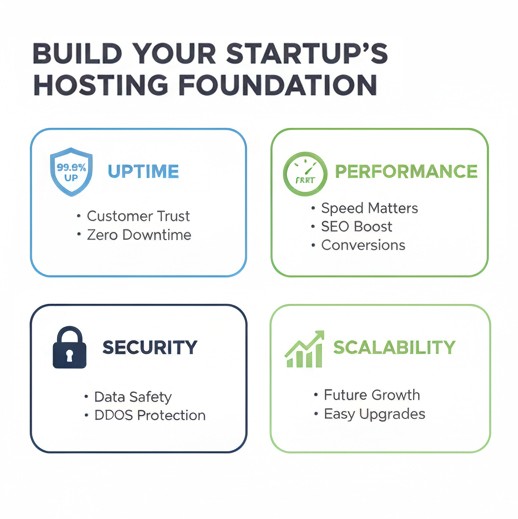Key Highlights
- The first hosting plan shapes how smoothly a startup can scale online.
- Uptime, speed, and security should be considered essential, not extras.
- Cheap hosting often creates hidden costs through downtime and lost growth.
- The right choice is affordable, reliable, and leaves room to expand as demand increases.
If you’re building a startup, chances are hosting isn’t the first thing on your mind. You’ve got product development, customer acquisition, and funding to worry about, so the website feels like a box to tick. Grab a cheap plan, point the domain, and move on.
But that decision isn’t as small as it looks. Hosting is the foundation that your online presence stands on, whether that’s a landing page, a customer portal, or a full SaaS platform. If the server goes down, customers don’t see your product. If it runs slowly, they don’t stick around long enough to sign up.
The first hosting plan you choose has more influence than most new founders expect. Go too cheap, and you’ll run into bottlenecks just when growth starts. Overspend too early, and you’ll burn runway on capacity you don’t need yet. The right plan is somewhere in between — reliable, flexible, and suited to how fast you expect to grow.
The Startup Hosting Dilemma
Early-stage founders tend to fall into one of two traps. Either they pick the cheapest hosting plan they can find, or they overcompensate and pay for a “big business” solution before they’ve signed their first customer.
Both approaches have problems. The bargain plan may work for a basic landing page, but once you add more users, analytics scripts, or a modest spike in traffic, you’ll feel the cracks. On the flip side, paying enterprise rates when you don’t yet need the features drains resources that could be used to hire talent or improve the product.
The dilemma isn’t just cost — it’s about timing. Your first hosting choice has to support the business you’re building now, while leaving room to expand when growth arrives.
What Really Matters in Early Hosting Decisions
When you strip away the marketing from hosting providers, the essentials boil down to a handful of things. Uptime is non-negotiable. If your site is down when a journalist clicks your link, you’ve missed a valuable opportunity.
Performance matters too. A few seconds of lag when loading a page can feel minor, but research consistently shows that slower sites see fewer sign-ups and higher bounce rates. For a startup, every visitor counts.
Security is another baseline. SSL certificates, backups, and some level of DDoS protection should be part of the package from day one. You can’t afford to lose user trust early on because of preventable security gaps.
Finally, scalability is where many new teams stumble. Look for hosting that makes it simple to increase resources without migrating everything to a different environment. Growth is unpredictable, and the last thing you want is a major migration project right when your user base starts accelerating.

Cost vs Value
There’s a subtle but important difference between something that’s cheap and something that’s good value. Cheap hosting often saves you money upfront but costs you later in downtime, missed leads, or emergency support. Value means you’re paying for stability and the ability to grow without unexpected costs.
For most founders, the sweet spot is finding affordable business hosting that balances predictable monthly fees with the essentials: reliability, performance, and support. It’s not about squeezing every dollar until it breaks — it’s about making sure what you spend now prevents bigger, more expensive headaches later.
Case in Point: Fast Growth Scenarios
Picture this: a SaaS startup launches on Product Hunt. Within a day, traffic jumps from a few dozen visitors to thousands. If the hosting plan can’t cope, those new users see timeouts instead of a sign-up page. That wave of interest is gone.
Or take a small e-commerce brand that suddenly goes viral on social media. Orders triple in a week, but the site slows under the weight of all the extra requests. Some customers complete checkout, others abandon their carts because the process drags. Again, the issue wasn’t demand — it was infrastructure.
In both cases, hosting didn’t just support the business. It decided whether those growth moments turned into lasting success or missed chances.
Red Flags to Watch For
Some warning signs show up early if you know what to look for. Watch for hosting providers that tack on hidden fees for basics like SSL or backups. Avoid plans with no clear upgrade path — if the only option is migrating everything to a new platform once you outgrow the starter tier, that’s future pain waiting to happen.
Pay attention to infrastructure transparency too. If a provider won’t say where their data centers are or what tech stack they’re using, that’s a red flag. And don’t overlook support. If you can’t reach someone quickly when traffic spikes, it doesn’t matter how nice the control panel looks.
Best Practices for Startups Choosing Hosting
Think ahead by at least six to twelve months. You don’t need to predict everything, but you should choose hosting that won’t force you into a disruptive change the moment growth begins.
Check whether the provider documents how upgrades work. Can you scale resources instantly, or is it a ticket-based process that takes days?
Look for providers who include basic security features upfront — SSL, backups, monitoring — without upselling you at every step. And above all, make sure support is available around the clock. Growth doesn’t wait until business hours, and neither do outages.
Conclusion
Hosting may feel like a small line in the budget, but it underpins everything about your online presence. For a startup, it’s often the difference between scaling smoothly and scrambling to patch over problems at the worst possible time.
The first hosting plan you choose shouldn’t just be the cheapest option on the list. It should be a launchpad that lets you build with confidence, adapt as you grow, and keep customers connected no matter how much traffic comes your way.
FAQ
Why shouldn’t startups just pick the cheapest hosting plan?
Cheap plans often come with limitations like slow performance, poor support, and no clear upgrade path. These issues tend to appear just when growth starts, making the “savings” short-lived.
What hosting features should a startup prioritize first?
Uptime guarantees, solid performance, SSL certificates, backups, and easy scalability. These provide a stable base without overcomplicating early operations.
How can hosting affect customer trust?
If a site is down or loads slowly, potential customers are more likely to leave and may not return. Secure, reliable hosting shows professionalism and builds trust from the first interaction.
When should startups consider upgrading their hosting?
The moment you see consistent growth in traffic or functionality needs beyond your current plan. Good hosting providers make this transition seamless without forcing a disruptive migration.
What’s the difference between cheap hosting and affordable hosting?
Cheap hosting focuses only on price, often cutting corners on reliability. Affordable hosting balances cost with the features and support startups actually need to grow.












